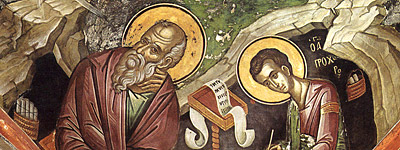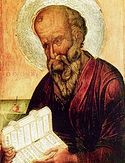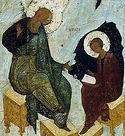

| Previous day | Next day |
| Old Style
May 8
|
Tuesday |
New Style
May 21
|
| 3rd Week after Pascha. Tone 2. | No fast.
|
![]() Apostle and Evangelist John the Theologian (98-117).
Apostle and Evangelist John the Theologian (98-117). ![]() St. Arsenius the Great, of Scetis (449-450).
St. Arsenius the Great, of Scetis (449-450).
St. Pimen the Faster, of the Far Caves in Kiev (12th c.). St. Arsenius the Lover of Labor, of the Kiev Caves (14th c.) Sts. Zosima and Adrian, of Volokolamsk, founders of the Sestrinsk Monastery (15th c.-16th c). Translation of the relics of St. Arsenius of Novgorod, fool-for-Christ (1785).
St. Hierax of Egypt (5th c.). St. Iduberga, foundress of Nivelles (Neth.) (652). Sts. Wiro (710) and Plechelm (730), missionary bishops, and Otger, deacon (8th c.), in the Maas Valley at Limburg (Neth.). St. Macarius of Ghent, archbishop (1012). St. Emilia (375), mother of Sts. Macrina, Basil the Great, Naucratius, Peter of Sebaste, and Gregory of Nyssa. Commemoration of the healing of the blinded Stephen by the Icon of the Most Holy Theotokos of Cassiopia (1530).
Repose of Hieroschemamonk Michael of Valaam, confessor for the Orthodox Calendar (1934).
Thoughts for Each Day of the Year
According to the Daily Church Readings from the Word of God
By St. Theophan the Recluse

Tuesday. [Acts 8:5–17; John 6:27–33]
Then Simon himself believed also: and when he was baptized, he continued with Philip (Acts 8:13). He both believed and was baptized, but nothing came of him. One must think that there was something not quite right in the formation of his faith. Sincere faith is the renunciation of your mind. You must bare your mind and present it to faith as a clean slate, so that faith might inscribe itself on the mind as it is, without any mixing in of alien definitions and tenets. When one’s former beliefs remain in the mind, then a mixture occurs in it after the tenets of faith are written there. The consciousness will be confused between the mind’s sophism and the operations of faith. Simon was therefore a model for all heretics, as all who enter the realm of faith thinking as they did as before. They are confused in the faith and nothing comes of them other than harm: for themselves—when they remain silent, for others—when this confusion is not kept within them alone, but breaks out to others, due to their thirst to be teachers. Hence there always turns out to be a party of people more or less sinning in the faith, with a wretched surety of their correctness, and with a calamitous drive to remake everyone their way.
Articles
 St. John the Theologian |
 The Inexhaustible Ocean of Christ’s Divine LoveHieromartyr Thaddeus (Uspensky)Where the spirit of love blows, it is easy and free to breathe. |
 Venerable Arsenius the GreatSaint Arsenius the Great was born in the year 354 at Rome into a pious Christian family, which provided him a fine education and upbringing. |
 Venerable Pimen the Ascetic of the Kiev Far CavesSaint Pimen, Faster of the Caves, won fame by his exploit of fasting. |
 Venerable Arsenius the Lover-of-Labor of the Kiev Far CavesSaint Arsenius the Lover of Labor lived during the fourteenth century. |
 Orthodoxy in the Low Countries. Part 3: Great Monastic Saints and PenitentsMatthew HartleyWe now turn to some of the great monastic figures of the Low Countries. |





